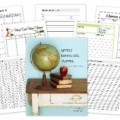
Staying on top of your bills is a must to help take control of your family finances. You need a method of deal with the bills that come through your post or emails, and then record your payment due dates.
I have my own home filing system to help manage our family bills and outgoings. It’s set up in a way that if something does happen to my, my husband can quickly check it and take over or someone else can find exactly what they need. This system doesn’t just take care of bills but all paperwork that could be required later.
Get a Folder
A folder is the first step to creating your home filing system. I have a large A4 folder for my home bills and then another one for work bills since I work from home. Large ones are great to keep hold of all paperwork necessary.
Get dividers to use to split up the various accounts. I’ve split ours up into rent (or mortgage), gas and electric, internet and phone, council tax, bank accounts/credit cards/loans, car costs and then a miscellaneous section.
Open Bills as Soon as They Come Through
It’s tempting to leave the bills to one side, but you want to make sure there are no nasty surprises. There are stories of people paying hundreds each month for something they didn’t realize they were paying for, all because they didn’t check!
Open the bills and note down the bill due date and amount in a diary. I’m fairly old-fashioned and do it all with a paper diary, but you could use your smartphone calendar to mark it all down. With a smartphone, you can set up reminders to make sure you don’t forget.
Put the bills into your home filing system right away. Placing them at the front will make sure you can deal with them quickly.
Set Up a Standing Order/Direct Debit
I quite like the features on internet banking that now allow people to set up standing orders, direct debits and scheduled payments. If you struggle to remember to pay a bill on time, set up one of these with your bank. Everything except the odd car payment (the repairs and MOT) are set to be paid automatically.
Due dates are still written down to make sure there is enough money in the account. I tend to move as much into savings accounts and move back across where necessary due to the way I’m paid and the bonuses my husband can sometimes receive from his own work.
Eventually, you get used to the dates of your set payments. You’ll find that writing them down in the diary is just a formality.
Mark Once Paid
Once a bill has been paid, mark on the paperwork that you’ve done it. This is especially beneficial if you choose to pay your bills earlier than stated. This is something I did with credit card bills (now cleared) and I still do with my self-employment tax payments since I have the money in a savings account ready to go.
Marking on the paperwork helps to keep your folder in order. It’s also worth marking against the due date you’ve written in the diary to make sure you don’t pay it twice! Mark it with the date paid, so you have a reference if you need it in the future.
Get Rid of the Unnecessary Paperwork
There’s no point keeping credit card bills from two years ago, unless you need them for your business (hence why I have two different folders). After a couple of months, there are slim chances that you will actually need those old bank statements and bills.
Keeping them could lead to identity risks. If someone breaks into your house, think of the amount of paperwork they could easily get their hands on!
It’s important to shred as much as possible on a regular basis. I tend to shred bank statements and bills after two months, unless there is something on them that I need immediately. The benefit of internet banking is that you can now access most of your bank statements and copies of bills online.
Your home filing system is a great way to make budgeting easier and help you stay out of debt. You can track when your payments are due, which accounts they need to go into and when they have been paid. The folder works really well in our house and could be just what your house needs.








